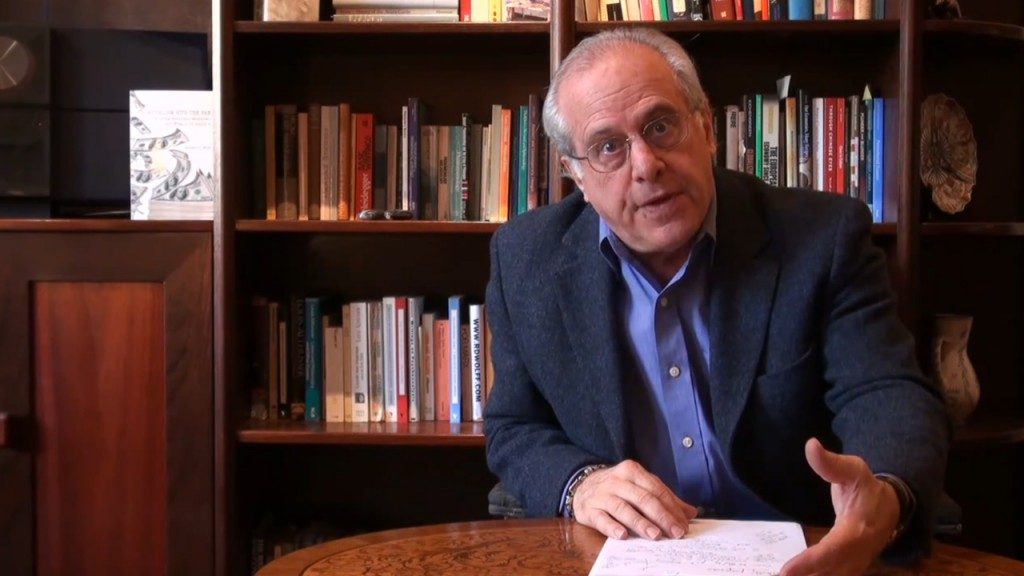
Richard D. Wolff – What are Capitalism & Socialism? What differentiates them from each other?
In this interview with Professor of Economics Emeritus (University of Massachusetts), Marxist economist and founder of Democracy at Work, Richard D. Wolff, we talk to him about Capitalism and Socialism.
All of this and more is addressed in the video below:

Richard D. Wolff is Professor of Economics Emeritus, University of Massachusetts, Amherst. He is currently a Visiting Professor in the Graduate Program in International Affairs of the New School University in New York. Wolff has also taught economics at Yale University, City University of New York, and the University of Paris I (Sorbonne). He is a co-founder and contributor of Democracy at Work, a non-profit organization that promotes democratic workplaces as a key part of a transition to a better economic system. Wolff has published many books and articles, both scholarly and popular. Most recently, in 2012, he published the books Democracy at Work: A Cure for Capitalism (Haymarket Books) and Contending Economic Theories: Neoclassical, Keynesian, and Marxian, with Stephen Resnick (Cambridge, MA, and London: MIT University Press). He writes regularly for Truthout.org. He has been interviewed on The Charlie Rose Show, Up with Chris Hayes, Real Time with Bill Maher, Democracy Now!, Al-Jazeera English, Thom Hartmann, NPR, Alternative Radio, and many other radio and TV programs in the United States and abroad. The New York Times Magazine has named him “America’s most prominent Marxist economist.
In case you think independent media and journalism are important in today’s day and age, then click here to access our crowdfunding platform. Here are some opinions from our crowdfunding supporters:

Link: valleyadvocate.com/2016/07/11/hard-to-find-and-worth-your-time/
10 Antworten auf „VIDEO: Richard D. Wolff – What are Capitalism & Socialism? What differentiates them from each other?“
[…] Beitrag VIDEO: Richard D. Wolff – What is Capitalism & Socialism? What differentiates them from each o… erschien zuerst auf acTVism […]
New York Times proclaimed Richard D. Wolff as the most prominent Marxist and that is exactly how capitalism secures its position in our society. In another words as long as Marxism exist capitalism does not need to fear for its future. Richard D. Wolff defines socialism as one voice one vote in economy, which is wrong. One voice one vote does not work even in democracy, because democracy we have today does not follow the will of people. We need a new democracy based on equal human rights. Here is how it looks like: http://www.sarovic.com/future_of_democracy.htm. We need a new capitalism more based on equal human rights which must include the right to work to everyone. Here is how it looks like: http://www.sarovic.com/2013_01_18e.htm. When that is fulfilled then we may talk about socialism which must be based on equal human rights developed to such an extend that no one could imagine it today.
“…which is wrong” A definition cannot be wrong in this context. It is simply stating what you mean.
It is wrong because we can’t have an equal decision power with professionals if we know nothing about it. We need to let professionals decide in our name if they want it, but if they disappoint us, we need to have the right to punish them that much so that they never try it again. This is what developed democracy should be.
Here it is how socialism should look like: http://www.sarovic.com/marxism.htm Marxists do not like it because it will be based on more market than capitalism could afford and no revolution is required.
[…] Massachusetts professor emeritus of economics Richard Wolff, the grass-roots media portal Actvism gets answers to the following […]
[…] This video is part of an educational & historical series with Professor of Economics Emeritus (University of Massachusetts), Marxist economist and founder of Democracy at Work, Richard D. Wolff. […]
Traduzcan también en español!
[…] Massachusetts professor emeritus of economics Richard Wolff, the grass-roots media portal Actvism gets answers to the following […]
[…] Part 1 of an interview with Richard D. Wolff, Marxist economist and founder of Democracy at Work – acTVism.org […]